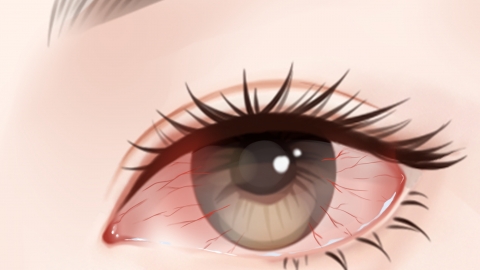What are the symptoms of allergic conjunctivitis?
Generally, allergic conjunctivitis refers to allergic conjunctivitis, and its symptoms include itchy eyes, red eyes, increased eye secretions, photophobia, and tearing. A detailed explanation is as follows:

1. Itchy Eyes
When ocular tissues come into contact with allergens, the immune system identifies them as harmful foreign substances and initiates an immune response. During this process, immune cells release chemical mediators such as histamine, which stimulate the nerve endings in the eyes, causing itching.
2. Red Eyes
Allergic reactions cause dilation of the conjunctival blood vessels, resulting in noticeable ocular congestion that appears as redness in the white part of the eye. The severity varies among individuals; mild cases may show slight reddening, while severe cases may present with diffuse bright redness across the entire white of the eye, which is visibly apparent.
3. Increased Eye Secretions
Allergic reactions stimulate secretory cells such as goblet cells in the eyes, increasing their secretory activity to produce excessive mucus in an attempt to remove allergens and other irritants. Secretions are typically more pronounced upon waking up in the morning, which may cause difficulty in opening the eyes, or they may be continuously produced during the day, requiring frequent wiping.
4. Photophobia
Allergic inflammation affects the normal functioning of ocular tissues such as the cornea, reducing their tolerance to light. Patients may experience eye discomfort and a burning sensation under normal light intensity, exhibiting photophobia. In severe cases, wearing sunglasses may be necessary to alleviate discomfort caused by light sensitivity, and protective responses such as tearing and eye closure may occur even in bright light.
5. Tearing
When the eyes are stimulated by allergens, the lacrimal glands are stimulated to secrete excessive tears, resulting in tearing. This may manifest as occasional mild tearing or frequent episodes of profuse tearing, which not only affects the patient's vision but also causes redness, itching, and other discomforts in the periorbital skin due to prolonged exposure to tears.
It is important to maintain ocular hygiene in daily life, avoid rubbing the eyes with hands to prevent introducing allergens into the eyes; try to identify individual allergens and avoid contact—for example, reduce outdoor activities during pollen season and maintain indoor cleanliness to minimize allergens such as dust mites.







